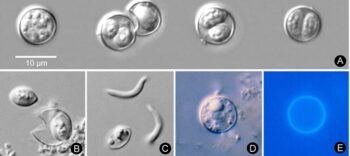Cyclospora: What Is The Parasite Infecting Some Texans, And How Does It Spread? - Texas A&M University Today

Dr. Shawn Gibbs says Cyclospora infections are not uncommon and can be prevented with proper washing of hands and food. Pictured: Cyclospora cayetanensis under various conditions and stages of development.
U.S. Centers for Disease Control and Prevention
An increased number of infections caused by the Cyclospora parasite have been detected in the Houston area this summer, prompting warnings from health officials.
Over the weekend, local public health authorities in Harris and Fort Bend counties issued statements urging residents to avoid unwashed fruits and vegetables, a common carrier of the parasite that causes intestinal illness in humans. According to the Houston Chronicle, Harris County typically sees around 90 cases of Cyclospora infection each year. There have already been at least 25 confirmed cases in 2023, and the infections tend to crop up more frequently during summer.
For more information on this recent cluster of cases — including tips for preventing the spread of Cyclospora — Texas A&M Today spoke with Dr. Shawn Gibbs, an industrial hygienist and dean of the Texas A&M University School of Public Health.
What is Cyclospora, and how are Cyclospora infections typically contracted?
Cyclospora cayetanensis is a parasite that can cause the illness Cyclosporiasis. Essentially, you contract the illness by ingesting the microscopic parasite through food or water that has been contaminated with the feces of an infected individual.
In the United States, this is normally a result of either poor handwashing of an infected person working in food preparation, or fruits or vegetables that were contaminated during harvest not being properly washed before consumption. Essentially, you have to ingest someone else's feces to be infected.
Many people do not realize that Cyclospora is not easily killed by hand sanitizer or other chemicals, so you need the physical removal of the parasite from hand washing. It can also survive in the chlorine-rich environment of a pool long enough to infect others. So if an infected child has an accident in the pool, which could go undetected, it could infect others.
What are the signs that a person is suffering from a Cyclospora infection?
The signs and symptoms are what most people associate with a foodborne illness. There will be watery diarrhea, cramping, bloating and increased gas. The person will suffer from fatigue, nausea, loss of appetite, and in some cases, the person may vomit or have a low-grade fever. These symptoms make for an unpleasant experience that also leads to weight loss.
All of this starts from two days to two weeks after you have ingested the contaminated food or water, which makes it difficult for you as an individual to determine where you were infected, but your local health department has the ability to track down potential sources.
Who is most at risk?
People who eat a lot of unwashed fresh produce are more likely to be infected. Most individuals will recover on their own and at home without treatment but still using anti-diarrheal medicines and plenty of fluids to prevent dehydration. Given the current heat wave here in Texas, fluids to prevent dehydration are even more important than normal.
If someone is not treated, then the symptoms normally last for a few days. However, they could last for over a month, with symptoms seeming to come and go over that time period. Those who are very young, elderly or are immunocompromised may require treatment in a hospital with the appropriate antibiotics.
How significant is this cluster of cases in Houston, and why do you think this is happening now?
While the number of cases is above what is expected, the proportion of cases in Houston is still small. Normally, you expect to see an increase in these types of infections during the summer months, which is a time when people tend to consume more raw fruits and vegetables, and have more water-based activities. People can also be less vigilant about hand washing during non-flu season and during outdoor activities.
What steps can individuals take to protect themselves and their loved ones from a potential Cyclospora infection this summer?
Prevention starts with good hand washing techniques and thoroughly washing all fruits and vegetables. Don't just use hand sanitizer. If someone is infected, they should avoid public pools and other water attractions for at least two weeks. If you are in pools or other shared bodies of water, do not put the water in your mouth.
What steps can health authorities take to prevent further spread of this illness?
The state and local health authorities are already tracking this, which is why we know about it. They are doing outbreak investigations to help determine the sources. They are also putting information out there to better educate the public to be cautious and to properly wash hands as well as fruits and vegetables, including our food preparation areas.
Comments
Post a Comment